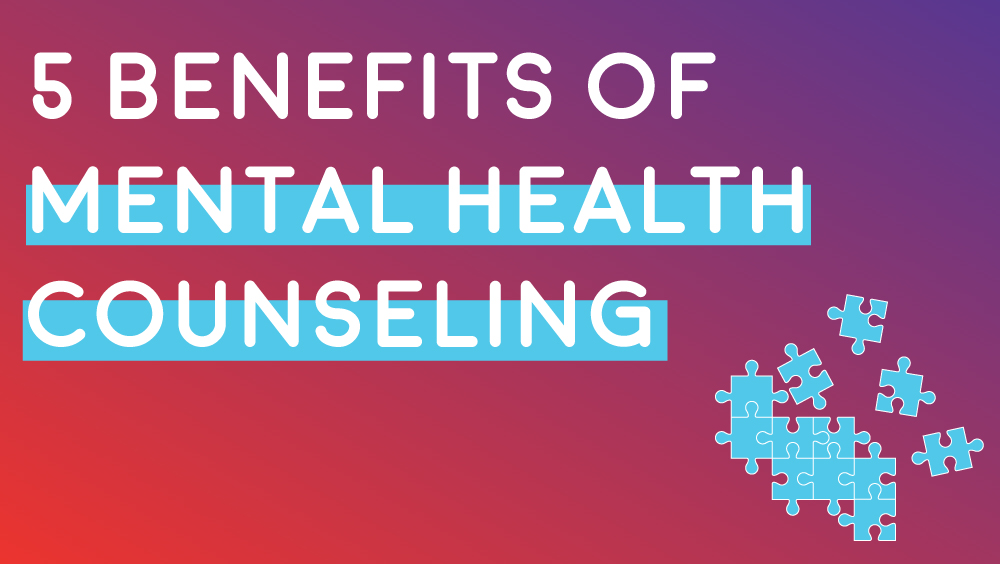The Single Strategy To Use For Mental Health Counseling
The Single Strategy To Use For Mental Health Counseling
Blog Article
Things about Mental Health Counseling
Table of ContentsNot known Facts About Mental Health CounselingFacts About Mental Health Counseling Revealed4 Easy Facts About Mental Health Counseling ExplainedMental Health Counseling - TruthsThe 2-Minute Rule for Mental Health Counseling
With treatment, you can obtain understanding right into your very own patterns of habits and communication, which can cause more fulfilling and satisfying relationships with close friends, family, and enchanting companions. What we believe, we materialize. If you're consumed with negative feelings and adverse ideas that are disrupting your life, treatment can assist.Like our ideas, sometimes our behaviors end up being harmful. They can keep us from living a positive and healthy way of life. Maybe you deal with dependency, or you have a tendency to self-sabotage, or there are other adverse means you behave. Mental Health Counseling. Treatment can assist you change those behaviors that are having an adverse effect on your world and partnerships.

Obtaining therapy to resolve specific facets of your life can help you be extra productive in various other locations, including job.

The Basic Principles Of Mental Health Counseling
There are also much more benefits of therapy than just the ones we have actually reviewed., or construct partnerships (charming or those with household or pals) in a healthy method.
For the objective of the here and now research study, perceived benefits and obstacles to psychological health and wellness help-seeking are being explored. Previous research located that regarded barriers have a substantial result on university students' health and wellness actions selections (Von Ah, Ebert, Ngamvitroj, Park & Kang, 2003). Perceived advantages and obstacles to help-seeking were specifically selected because of their impact on decision-making and inevitably action (Glanz, Rimer, & Su, 2005).
The here and now research seeks to analyze whether or not preconception serves as an obstacle to therapy among university pupils. Eisenberg et al. (2011) proposed that hesitation about therapy effectiveness is another obstacle to taking part in therapy. Research study searchings for revealed that college students endorsed a number of barriers to joining treatment. Mental Health Counseling. Amongst these were: (1) preferring to manage psychological illness themselves, (2) not having sufficient time to take part in treatment, (3) inquiries about whether psychological health therapy works in remediating issues, (4) a belief that stress and anxiety is normal or the issue will certainly improve without treatment, (5) lack of cash, and (6) worry regarding what others would think if they discovered therapy involvement.
(2006) reported similar variables as obstacles to seeking therapy and additionally located that a skepticism of companies might restrain pupils from looking for aid. Team in campus psychological health centers might be regarded as unfriendly, and long wait times for solutions might be "repulsive" for trainees. Aspects facilitating more favorable perspectives are often at the contrary post of those variables recognized as obstacles.
A Biased View of Mental Health Counseling
One in three (34.6%) reported residing on university and one in 4 (23.3%) reported living with parents. Virtually half go to this site of pupils were associated with campus organizations and 1 in 10 reported remaining in a fraternity or sorority. Even more than one-third of students (38.1%) reported that they had a household member or close friend with a detected mental health and wellness disorder.

Rumored Buzz on Mental Health Counseling
Univariate F-tests identified particular subscale products that substantially varied. Women were much less most likely than males to view people who most likely to therapy as mentally weak, people that go to therapy as insane, to really feel that individuals with psychological illness should manage problems by themselves, that people that most likely to counseling as unable to address problems, that people that most likely to counseling are lazy, and to feel that individuals who go navigate to this site to therapy are various from typical people in a negative way.
Likewise, research results revealed that ladies were considerably much less likely than men to hold stigma-related mindsets. This follows previous research which additionally found that men hold higher levels of regarded stigma than women (Chandra & Minkovitz, 2006). Based on research findings, it appears that males might be much less likely than women to seek therapy due to low regarded barriers in addition to high stigma-related perspectives.
The Single Strategy To Use For Mental Health Counseling
On top of that, college health experts may use curricula targeting men with details on the advantages of psychological wellness therapy and the relevance of looking for aid when required. All approaches should be evaluated with future research to identify the impact on university student, specifically men. In contrast to basic populace researches which disclose that females are most likely to look for psychological wellness solutions contrasted to guys (Haunstein et al., 2006; Mackenzie, Gekoski, & Knox, 2006), the existing research study discovered no significant differences in the variety of regarded barriers to help-seeking behaviors based on sex.
This finding was unexpected and could highlight that those who had actually obtained therapy had a far better idea of delay times and other "accessibility" barriers that might make it challenging to start therapy. Possibly, individuals who have actually received counseling sight much more obstacles than participants who have find this actually not received therapy considering that looking for counseling solutions again might entail worry of self-disclosing individual information to a new therapist.
Report this page